Baby Steps walks a fine line between frustration and accomplishment to provide a walking simulator and climbing experience quite unlike anything else.
Never has a plank of wood held such dramatic tension. You will glimpse it on the path ahead, bridging a gap, and it will cause a moment of heart-stopping hesitation. It might produce such a feeling of fear you’ll backtrack, or look for another way around – it depends how many times you’ve been here before. You need to walk the plank but can you reliably put your feet where you want them to go? That’s the question. Hesitating preserves your hard-won progress and the efforts you’ve put into the climb so far, which hasn’t been easy. Stepping on the plank risks losing it. One small misadjustment and you’ll slip, and fall all the way down, down again.
I fell a lot in Baby Steps. You will fall a lot in Baby Steps. Everyone will fall a lot in Baby Steps. This is a game about falling, and about getting back up again. It’s a game of risky gaps and exorbitant-feeling punishments for failing to cross them. A torturous game of snakes and ladders played out across a landscape in front of you and around you. But it’s not all pain. There’s an unexpected gentleness and tranquility here, and a much more forgiving experience than you might be expecting.
Baby Steps is the new game from frustration-courting guru Bennett Foddy (in collaboration with Ape Out and UFO 50 maker Gabe Cuzzillo, and Dance Central and Ape Out maker Maxi Boch) who made QWOP and Getting Over It with Bennett Foddy. The former is a finger-tying game about controlling a sprinter’s limbs while running a race, which is incredibly difficult to do. The latter is a climbing game where a climber in a cauldron (don’t ask) levers themselves up and over a mountain using a sledgehammer. It’s also incredibly difficult, and it also involves many infuriating falls back to the bottom of the mountain. Baby Steps is similar. Baby Steps is a mush of them both.
Literally, it’s a walking simulator, where you control the legs of the game’s main character Nate, a couch potato who falls asleep and wakes up in a surreal dream-world. You need to explore said dream world but discover fairly quickly that walking isn’t as easy to do as you thought. It’s manual. Each step involves pulling a controller trigger to lift a leg and then pushing a thumbstick forward to shift the leg and move your weight so you can take a step. Most early attempts end up with you, Nate, face down on the floor, wobbling around like a beached seal. But it soon levels out; walking on a flat surface becomes reliably doable, with only occasional flops, which is an important concession in a game where there’s a lot of walking to do.
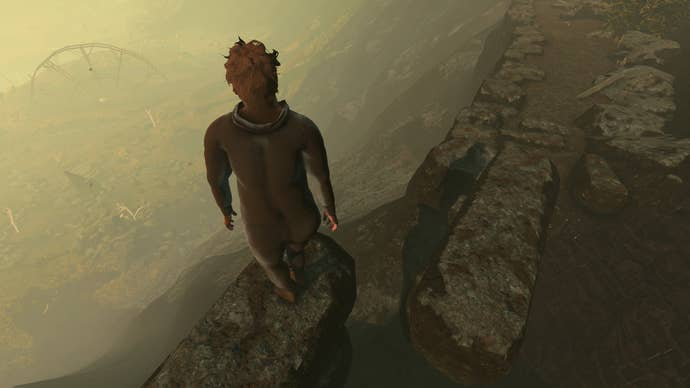
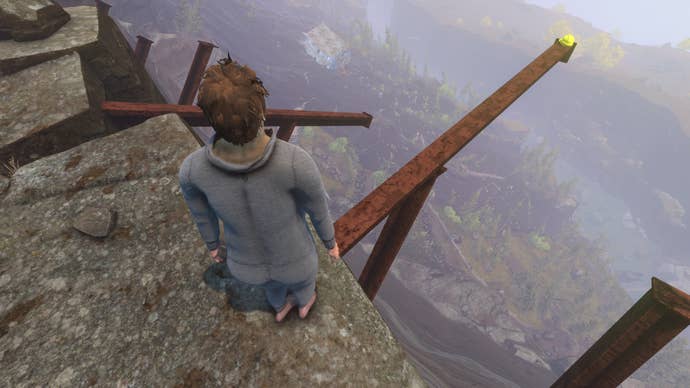
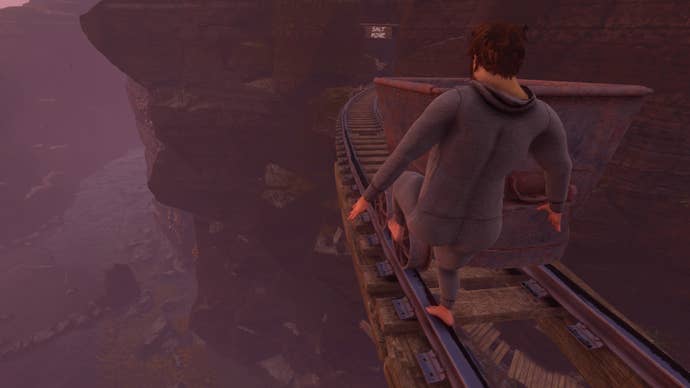
But complications come with obstacles. To begin with, it’s a fallen tree in your path, which requires a higher step than you’re used to taking, or a step-up to something you’ll need to take. And initially, you’ll marvel at a game that can ask so much of you when you’re struggling to even walk, but with each cluster of attempts, a deeper understanding of Nate’s movement will sink in; he’s actually a capable mover if you know how. Soon, then, you’ll step over logs without stopping to think, and begin tackling hills or rocky climbs or, yes, the dreaded wooden planks bridging gaps.
Inevitably, you’ll fall. You’ll place a foot wrong and slip and tumble, and slide down a long muddy slide to the foot of the hill, leaving Nate groaning on the floor. Why did the muddy slide have to be so long, you’ll wonder, and the plank so small? It’s in these moments Baby Steps will seem overly cruel, willing to take rather than give. And you’ll wilt at the thought of retracing your steps and hesitate more the next time you face the plank. But as far as cruelty is concerned, there’s an important invisible helping hand here to point out.
Baby Steps has options. Baby Steps has a semi-open kind of world, which means routes aren’t prescribed for you. Choke-points aren’t entirely unavoidable. Several routes will be loosely scattered around an area and it’s up to you which one you choose, which means, if a plank-cross is destroying you, you can leave it and try another way. You’re rarely ever forced to bang your head against one climb only, which is a blessed relief. It doesn’t mean alternative climbs will be any easier but it helps break up the flow and ease psychological blocks.
The genius of this semi-open world is having space for optional challenges on your path. You’ll notice, as you walk towards your broadly defined goal – a light on a hill, say – a crumbling spire or a ruined tower, or a tree, and wonder what’s at the top of it. This is a climbing game after all, so a climbing challenge holds an obvious allure. But you normally never know what’s at the top, unless you can see a glowing object there. And there’s an irreverent strain of humour running through the game that might mean there really isn’t anything at the top when you get there. It makes me smile.
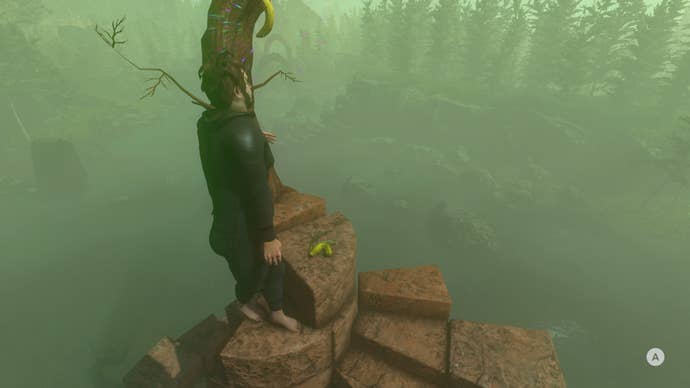
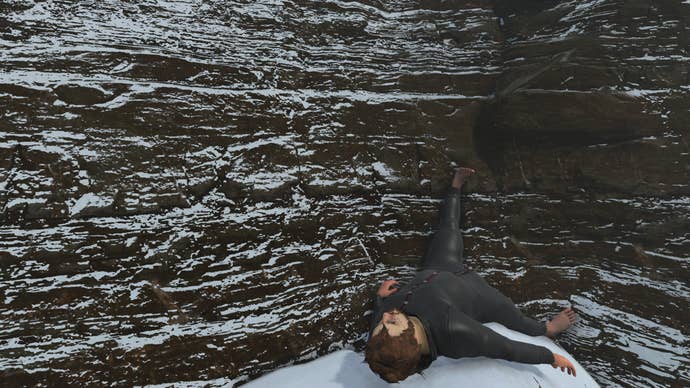
Optional challenges can be very hard, which they’re allowed to be because they’re optional. Or rather, they can feel very hard because you’ll often encounter them when you haven’t learnt the skills to tackle them yet – not unless you’re playing for a second time. Usually, you’ll attempt them, fail, and wonder how on earth you’re supposed to overcome something like that, then eventually give up and walk away. This is the beauty of optional: failing here doesn’t harm your main progress, which gives you the confidence to give them a go. And giving them a go is important because it teaches you things.
If you only ever walk along gradually sloping inclines between danger-planks, as I’ve come to call them, you’ll never get used to crossing the planks themselves. But if you try and climb a ruined tower that’s full of danger-planks, for instance, you will become much accustomed to them, such that when you reach the next plank you’ll wonder what you were so afraid of. These optional challenges not only provide the game with breadth and replayability, then; they prepare you for what lies ahead.
Plus, the extra space of the world provides breathing space of its own – crucial in a game which features tense challenge after tense challenge. Put all that tension in a sequence with no relief and people wouldn’t be able to cope with it. Broken up with sections of hassle-free walks across pleasant countryside or beside rushing rivers – the game is full of calming environments, necessarily so – and Baby Steps provides important moments of calm. And it’s in these moments you can ponder deeper thoughts, such as how taken for granted walking is, and what’s actually going on in this dream-world Nate found himself in. There is a story here, albeit an abstract, withheld one, full of inexplicably naked donkey men, but there’s enough mystery to pull you like a fishline through.
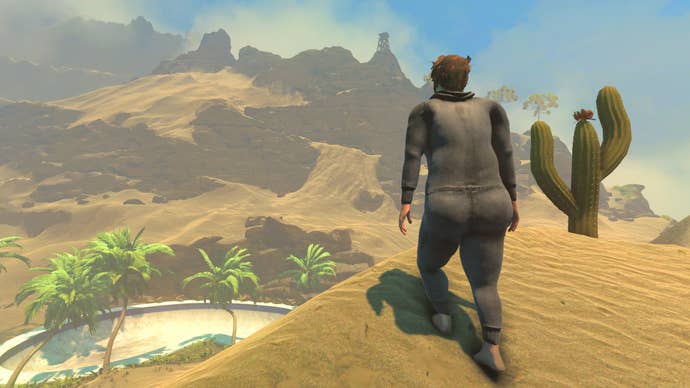
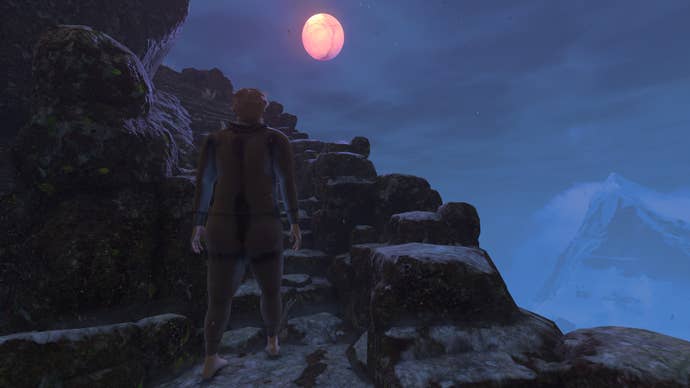
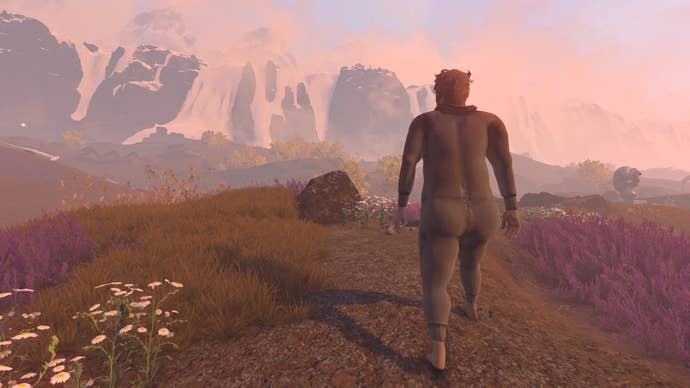
The story also provides another very welcome feature in the form of chapters, which progress with each bonfire you find. Each one signifies a change of environment and time of day, which provides much needed variation, both visually and mechanically, but each chapter also comes with something of an invisible safety net around it, which I really like. For instance: I struggled enormously in a ravine with a rapid underneath it because I had to climb a rickety ruined minecart track to get out, and I kept falling back down, many metres, into the ravine below. It’d take me ages to get back up but I couldn’t get around the minecart in the middle of the track at the top. A chokepoint.
But each time I fell into the water below, I would be swept away but, crucially, not over the edge of a waterfall and dumped into an earlier part of the world below. The game could do this quite easily; instead it would magically loop me back around and deposit me back where I began my minecart climb. The journey in the water would even present me with a couple of other possible climb locations along the way. So you see: an invisible safety net and multiple options, and it’s like this wherever in the world you go. Mostly. There is definitely a sense of a helping hand here.
Nevertheless, frustration will be what people talk about when they talk about Baby Steps, of that I have no doubt. I experienced it and you will experience it, and everyone who plays it will experience it. When I compared notes with Jim from the video team, he told me he’d rage-quit one night because of a cactus blocking a plank in a desert area of the game that he couldn’t get around. Cactus plank, he called it. I don’t remember that plank – perhaps I didn’t go there – but it’s an example of how lingo will crop up around notorious places in this game. “Mate, did you do the Manbreaker?” There is actually a climb called the Manbreaker in the game, and you’ll know why when you see it. Undeniably, this is a game that delights in finding imaginative ways to challenge you, and sometimes all you can do when presented with some of them – with, say, an escalator going backwards – is admire the deviousness and laugh. You wicked, wicked people.
But the flipside is immense satisfaction when you overcome one of these wickedly devised climbs. A sense of beating the odds. It’s amazing to me how a game about only moving your feet can be so impactful. There are no monsters to fight here – there’s no combat at all. This is a still and sedate world. Yet the hearth-thumping thrills I’ve felt playing this game have been so strong I could hear my heart in my ears. My palms have been so sweaty I thought I’d drop my controller. I have felt The Fear. And I have
revelled in a sense of accomplishment when overcoming it. I now relish challenges as a chance to test the skills I believe I’ve accrued. I see climbs in a different way. And again, it amazes me so much can come from, seemingly, so little.
How you cope with frustration will determine how you cope with Baby Steps, but – I stress again – it’s more approachable and forgiving than I assume many people will make out. That doesn’t mean it won’t infuriate you, or that you won’t curse at it and clench your jaw and throttle your controller, wondering why ragdoll Nate doesn’t get up quicker and why he always has to slide so far. But these quirks are Baby Steps, ragged though it can sometimes be. This is a game that behaves in its own way, and there is nothing else out there like it.
A copy of Baby Steps was provided for review by Devolver Digital.







